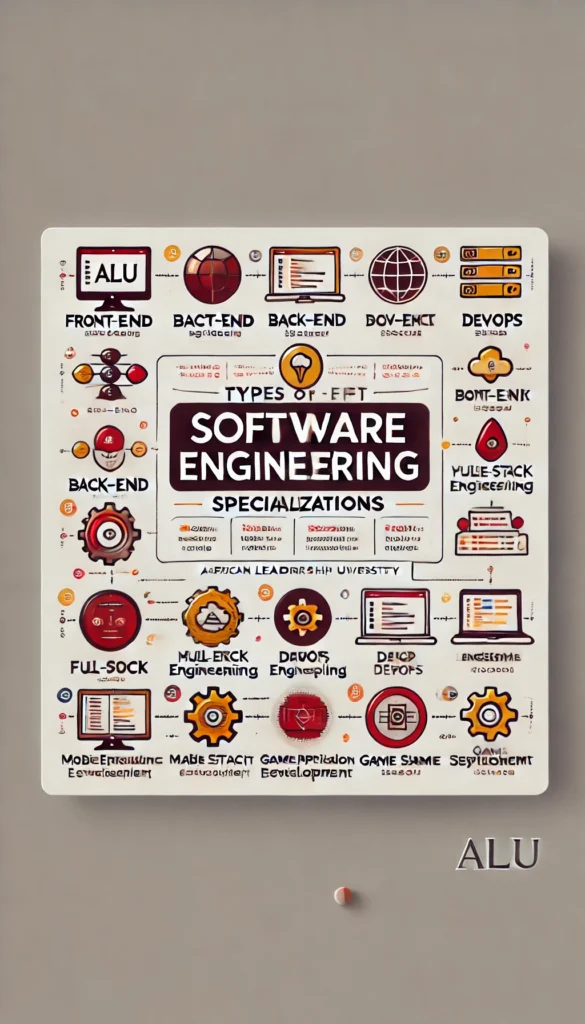Software engineering is one of the fastest-growing fields in the tech industry, with countless opportunities for specialization. As technology continues to evolve, aspiring professionals often ask, “What are the types of software engineering?” Understanding these specializations is essential to selecting the right career path. This article explores various software engineering types, the skills they require, and how to embark on a fulfilling career.
Types of Software Engineering
1. Full-Stack Engineering
Full-stack engineers combine front-end and back-end expertise, making them versatile professionals who can handle entire project cycles.
- Key Tools & Technologies: JavaScript, Python, MongoDB, Docker.
- Ideal Roles: Full-Stack Developer, Software Consultant.
- Industries: Startups, software houses, and tech consultancies.
2. Front-End Engineering
Front-end engineers focus on creating user interfaces (UIs) that are visually appealing and intuitive. They ensure seamless user experiences (UX) by developing interactive elements on websites or applications.
- Key Tools & Technologies: HTML, CSS, JavaScript, React, Angular.
- Ideal Roles: UI/UX Designer, Front-End Developer.
- Industries: E-commerce, media, and SaaS platforms.
3. Back-End Engineering
Back-end engineers work behind the scenes, ensuring databases, servers, and APIs function smoothly. They create the logic and infrastructure that power applications.
- Key Tools & Technologies: Python, Node.js, Ruby, SQL.
- Ideal Roles: Backend Developer, Database Administrator.
- Industries: Banking, logistics, and healthcare.
4. DevOps Engineering
DevOps engineers focus on streamlining the development process, bridging gaps between development and operations teams. They automate deployment pipelines to increase efficiency.
- Key Tools & Technologies: Jenkins, Kubernetes, Docker, Ansible.
- Ideal Roles: DevOps Engineer, Cloud Architect.
- Industries: Cloud computing, cybersecurity, and enterprise IT.
Good Read: Is Software Engineering Hard?
5. Mobile Application Development
Mobile developers specialize in creating applications for mobile platforms like iOS and Android. With the proliferation of smartphones, this field continues to expand rapidly.
- Key Tools & Technologies: Swift, Kotlin, Flutter, React Native.
- Ideal Roles: Mobile App Developer, iOS Developer.
- Industries: Gaming, fintech, and social media.
6. Data Engineering
Data engineers design and manage systems that store, process, and analyze data, supporting data-driven decision-making.
- Key Tools & Technologies: Hadoop, Spark, SQL, Python.
- Ideal Roles: Data Engineer, Data Architect.
- Industries: Artificial intelligence, business intelligence, and research.
7. Game Development
Game developers create interactive entertainment experiences across various platforms, using programming and design skills.
- Key Tools & Technologies: Unity, Unreal Engine, C++.
- Ideal Roles: Game Developer, Game Designer.
- Industries: Gaming, virtual reality, and simulation training.
Recommended Post: How long does it take to become a software engineer?
8. Embedded Systems Engineering
Embedded systems engineers design software for hardware systems, like IoT devices and automotive systems.
- Key Tools & Technologies: C, Assembly Language, MATLAB.
- Ideal Roles: Embedded Systems Engineer, IoT Developer.
- Industries: Automotive, consumer electronics, and aerospace.

Factors to Consider When Choosing a Specialization
Selecting the right software engineering path depends on several factors:
- Passion: Choose a field aligned with your interests.
- Market Demand: Research industry trends for high-demand roles.
- Skill Requirements: Assess the skills and tools required for each specialization.
- Career Goals: Consider long-term prospects and earning potential.
Good Read: What Does a Computer Software Engineer Do
How to Start a Career in Software Engineering
To succeed in a specialization, follow these steps:
- Gain Foundational Knowledge: Learn programming languages like Python and Java through platforms such as Coursera or edX.
- Earn Certifications: Pursue certifications in DevOps, AI, or mobile development.
- Build a Portfolio: Showcase projects on GitHub to demonstrate your expertise.
- Network: Join communities like freeCodeCamp to connect with professionals.
Conclusion
Software engineering is a great career choice with a lot of options to explore. By understanding the types of software engineering and aligning them with your goals, you can embark on a fulfilling career. Start your journey today by exploring African Leadership University software engineering degree that emphasize innovation and real-world skills.










